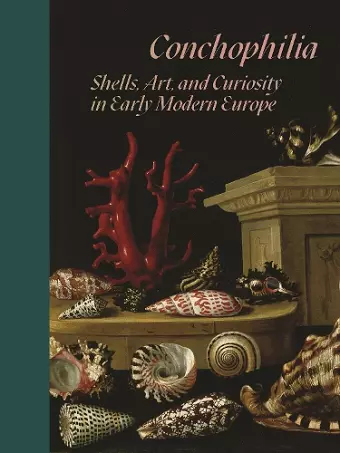Conchophilia
Shells, Art, and Curiosity in Early Modern Europe
Anne Goldgar author Marisa Anne Bass author Hanneke Grootenboer author Claudia Swan author
Format:Paperback
Publisher:Princeton University Press
Published:16th May '23
Should be back in stock very soon
This paperback is available in another edition too:
- Hardback£45.00(9780691215761)

A captivating historical look at the cultural and artistic significance of shells in early modern Europe
Among nature’s most artful creations, shells have long inspired the curiosity and passion of artisans, artists, collectors, and thinkers. Conchophilia delves into the intimate relationship between shells and people, offering an unprecedented account of the early modern era, when the influx of exotic shells to Europe fueled their study and representation as never before. From elaborate nautilus cups and shell-encrusted grottoes to delicate miniatures, this richly illustrated book reveals how the love of shells intersected not only with the rise of natural history and global trade but also with philosophical inquiry, issues of race and gender, and the ascent of art-historical connoisseurship.
Shells circulated at the nexus of commerce and intellectual pursuit, suggesting new ways of thinking about relationships between Europe and the rest of the world. The authors focus on northern Europe, where the interest and trade in shells had its greatest impact on the visual arts. They consider how shells were perceived as exotic objects, the role of shells in courtly collections, their place in still-life tableaus, and the connections between their forms and those of the human body. They examine how artists gilded, carved, etched, and inked shells to evoke the permeable boundary between art and nature. These interactions with shells shaped the ways that early modern individuals perceived their relation to the natural world, and their endeavors in art and the acquisition of knowledge.
Spanning painting and print to architecture and the decorative arts, Conchophilia uncovers the fascinating ways that shells were circulated, depicted, collected, and valued during a time of remarkable global change.
"In Conchophiliaseven scholars dissect why Renaissance-era collectors braved maritime hazards to beachcomb. Finding the pearliest treasures at shorelines called for avoiding crocodiles, spiny urchins and ‘burning sea slime’. . . . Painters depicted shells, with names as wonderful as ‘precious wentletrap’ and ‘speckled episcopal miter,’ arrayed on banquet tables or in the hands of exulting deities. Metalsmiths set nautiluses on gold pedestals sculpted with mermaid and sea foam motifs. Collectors had favorite shells cemented onto grotto walls, sometimes in the bristly shapes of pine cones and artichokes."---Eve M. Kahn, New York Times
"This richly illustrated collection of essays conceptualises the shell and how it was used in material and visual culture, philosophy, and aesthetics as a ‘vessel’ to comprehend early modern society, primarily in a Dutch and German context. . . . [A] well-produced and beautiful book, even its softly glowing endpapers reminiscent of polished shells and nacre. Of interest to art historians, historians of science, and historians of visual and material culture, the essays are also clearly written and approachable, offering many pearls of wisdom. I highly recommend it."---Anna Marie Roos, Early Modern Low Countries
"The exquisitely illustrated, thought-provoking book examines the complicated provenances, varied uses, and key role of shells in shaping this period’s visual and aesthetic culture."---Lauren Moya Ford, Hyperallergic
"[Conchophilia does] an excellent job in surveying both art history and the history of science to discuss the uses of shells in art. . . . The lavish illustrations alone are worth the price of purchase. . . . Truly a feast for the eyes."---Alan R. Kabat, American Conchologist
"Conchophilia is well-designed and beautifully illustrated, a book that deploys wonderful narratives about the love of shells in early modern Europe. . . . A captivating combination of the material and the social, of shells and people."---Marlise Rijks, Early Science and Medicine
"A very handsome book replete with full-color photographs, Conchophilia is a joy to read, as appealing and stimulating as the curiosities it considers."---James Clifton, Historians of Netherlandish Art Reviews
"All the studies in this beautiful book command respect: they are distinctly original and relevant and unfold with keen intelligence. With a novel, methodical approach, and by means of very subtle and magnificently illustrated analyses, they illuminate European collections of the first modern era."---Myriam Marrache-Gouraud, Renaissance and Reformation
"A thought-provoking and beautifully produced book. . . . [A]s all authors convincingly show in their chapters, a case can be made for the particular poignant love of shells from the early sixteenth century onward. Both as literal and metaphorical vessels, it is argued, shells prompted reflection, contemplation, and discussion, as material manifestations of exoticness, (natural and divine) craftmanship, and aesthetics."---Marika Keblusek, Renaissance Quarterly
"A fascinating book."---Christopher Stocks, Country Life
"Combining rigorous historical scholarship with gorgeous coffee-table book presentation, Conchophilia is an eye-opening exploration of a little-studied area of early modern collecting. . . . This book is a must-read for any scholars of curiosity cabinets or seventeenth-century collecting and situates itself firmly in this scholarly landscape. It also creates further lines for inquiry about shell collection outside of this area and period."---Nathan Cornish, H-Environment
ISBN: 9780691248592
Dimensions: unknown
Weight: unknown
224 pages